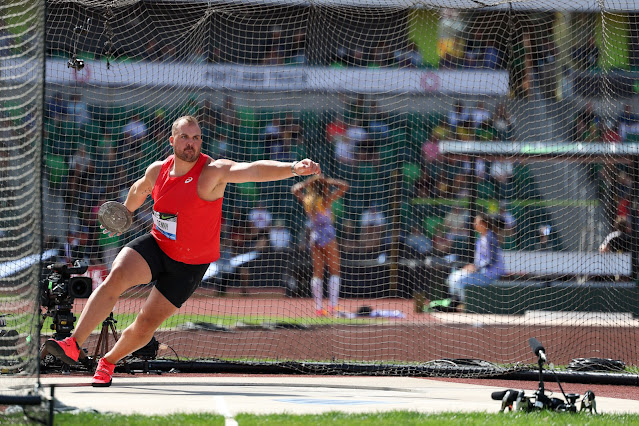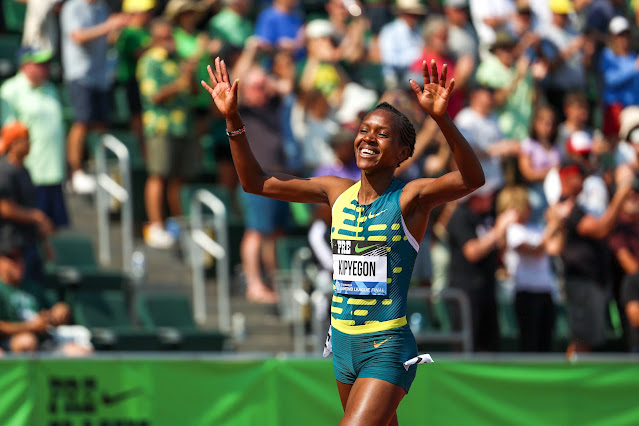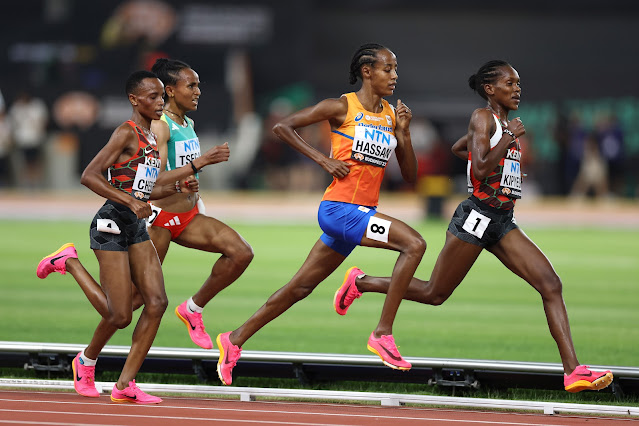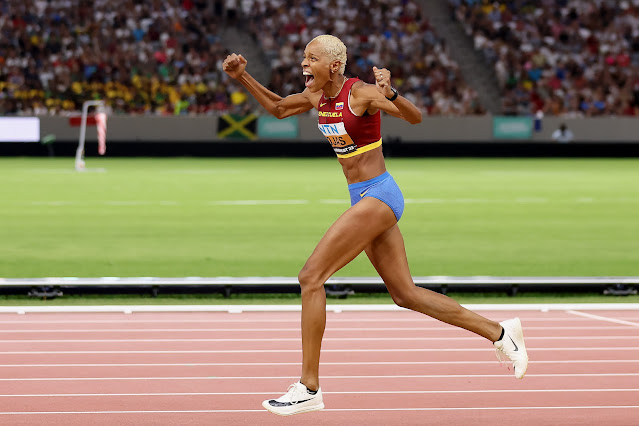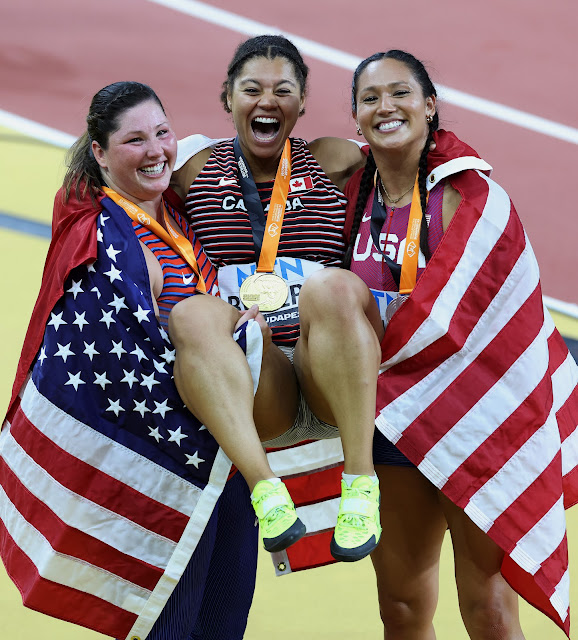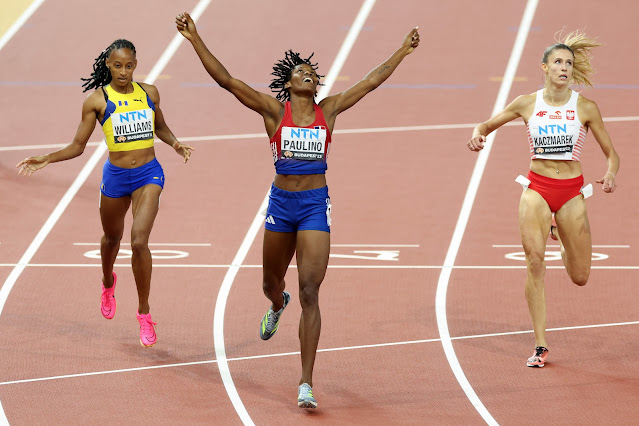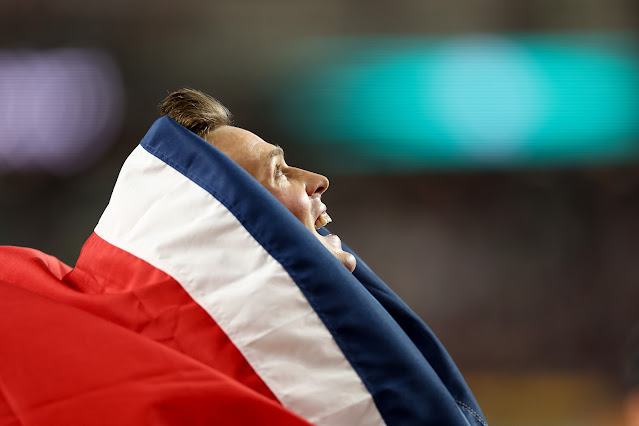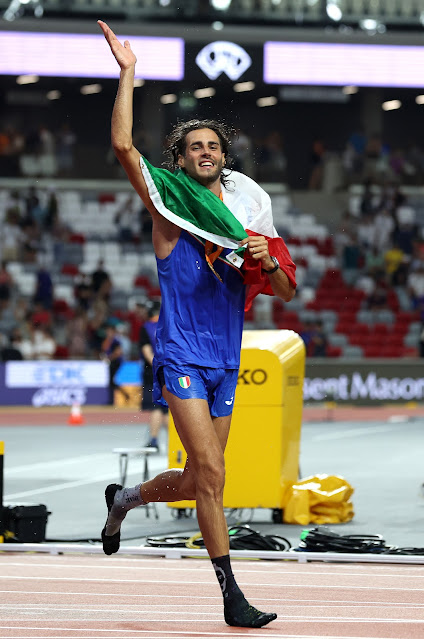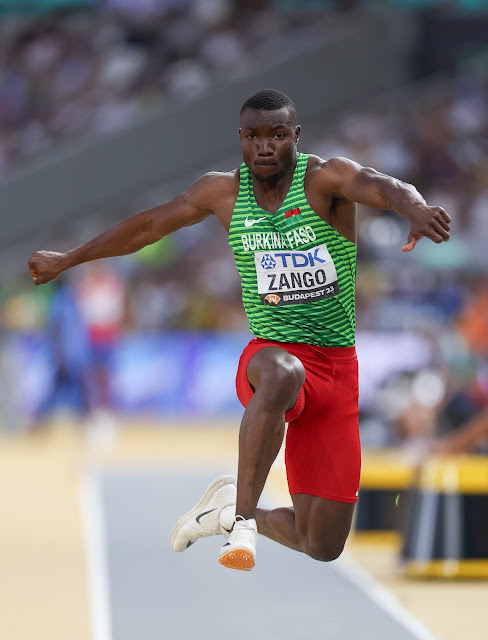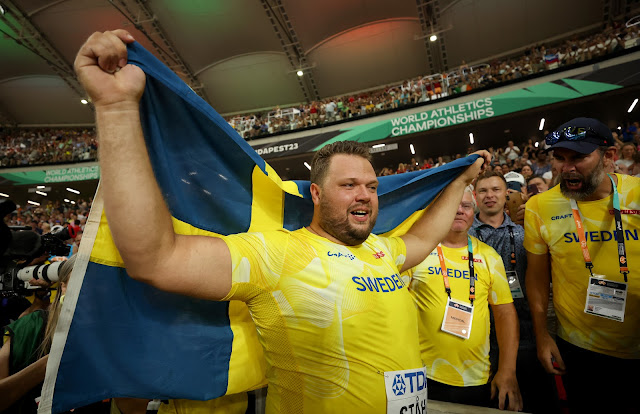"If you ain't Dutch, you ain't much" is a saying well-known among Dutch expatriates like my late mother. Sunday the Dutch 4x400m relay team featuring Femke Bol on anchor was too much for the rest of the world.
Bol, the World 400m hurdles champion, ran one of the most scintillating anchor legs in World Championship history. The Dutch brought themselves back from the depths of their first day to redemption on their last.
The schedule of the opening day was designed to have the 4x400 mixed relay as the closing event - something that would engage the audience and keep them coming back for more.
What wasn't expected was that the Dutch, in the incarnation of Femke Bol, would do a face plant mere meters from the finish while in the lead - much as teammate Sifan Hassan had just done in the final of the women's 10,000m. Instead of gold, the Dutch mixed relay team came away with no medals at all.
Today Bol, on anchor in the 4x400, got the baton at least 20 meters behind leader Jamaica. Inexorably, Bol narrowed the gap, and with 150 meters to go, it appeared she would move from 4th to 3rd and a position on the podium.
She did more than that, and with 10 meters left was in 2nd. In a truly remarkable close, Bol surged by Jamaica's Stacey Ann Williams, leaned, and won by .16 of a second. Another .16 back was the Great Britain and Northern Ireland team, and in 4th was Canada.
"It was one of my most important runs ever, but it is the first time we became world champions so it applies for all of us," said Holland's selfless star. "Every tenth and hundredth of a second was needed. We had good exchanges and still barely won it."
From the last event on the first day to the last event on the last, the Dutch relay teams embodied the heartbreak and triumph that defined the intervening days.
These Dutch Are Much
World 4x400m Relay Champions
Femke Bol, Cathelijn Peeters, Lieke Klaver, Eveline Sandberg
photo by Stephen Pond/ Getty Images for World Athletics
In the men's 4x400m, the United States team of Quincy Hall, Vernon Norwood, Justin Robinson, and Rai Benjamin took the lead early and the outcome was not in doubt, barring faceplants or dropped batons.
The US ran a world leading time of 2:57.31, while France set a national record in 2nd at 2:58.45. Great Britain and Northern Ireland, Jamaica, and India followed.
Said anchor Rai Benjamin (3rd in the intermediate hurdles), "After the 400m hurdles I wanted to come back and anchor this relay. It means a lot that the guys have faith in me and trust me. It is amazing."
For India to have made the 4x400m final was historic in itself as India has now qualified for the semis at the Paris Olympic Games. It will be India's first long relay appearance in the Olympics.
India's Javelin Sensation
World Champion Neeraj Chopra
Photo by Christian Petersen/Getty Images for World Athletics
All in all, not a bad day for India, as its javelin contingent finished 1-5-6, with national hero and Olympic champion Neraj Chopra leading the way at 88.17 (289-3) to win India's first ever World Championships track and field gold medal.
"This has been a great championships for India and I am proud to bring another title to my country," said India's track and field superstar.
Somewhat unbelievably, second place of 87.82 (288-1) went to Arshaad Nadim, with Czech veteran Jakub Vadlejch third in 86.67 (284-4).
Why unbelievably?
Because Nadim is from Pakistan.
That's right, India and Pakistan went 1-2 in the javelin.
And what did Chopra and Nadim do at the end of the competition?
They hugged each other.
India and Pakistan hugging each other on the infield of the World Championships?!
It now, officially, will never ever get better than this.
Unless, of course, it does.
Just weeks after the Russian invasion of her native Ukraine, Yaroslava Mahuchikh won the World Indoor high jump title, much to the delight of the fans in Belgrade. She had had a terrifying escape from her homeland just to get to Belgrade, and hasn't been home since.
"I have to win this gold for my country and all Ukrainian people who are still fighting for peace in Ukraine and for our independence," she said.
The 21 year old from Dnipro already had two World silvers and one Olympic bronze. Today she added gold to her remarkable resume.
She was clutch with first jump clearances at 1.97 (6' 5.5") and 1.99 (6' 6.25"), and her second attempt clearance at 2.01 (6' 7") sealed the deal over two accomplished Australians.
2022 World titlist Eleanor Patterson's first jump clearance at 1.99 (6' 6.25") was the difference between silver and bronze. It took teammate and Olympic silver medalist Nicola Olyslagers a second jump to clear at the same height and this sorted the medals.
Great Britain's Morgan Lake, who won the U-20 high jump and heptathlon titles in Eugene in 2014, was 4th at 1.97 (6' 5.5").
Yaroslava Mahuchikh
Ukraine's High Jump World Champion
photo by Stephen Pond/Getty Images for World Athletics
Who needs redemption at age 22? That would be Jakob Ingebrigsten (Nor) who won silver in the 1500m for the second Worlds in a row.
Let's hope he is feeling a bit better as he just won his second consecutive 5,000m title. Ingebrigsten ran a scorching last lap 52.45 to win in 13:11.30.
Mohamed Katir (Sp) held the lead until he didn't and succumbed to Ingebrigsten's withering kick by .14 to win silver. Kenya's Jacob Krop was 3rd, and as if to put a finer point on how close this race was, look at Ingebrigsten's wining time and reflect on this: the top 8 were at 13:12.99 or faster, and they all finished within 1.69 seconds of each other.
While defending World and Olympic 800m champion Athing Mu was the favorite of many, it was hard to pick someone to win who had had so few races this year. In one interview this spring, she said she'd rather spend time on her flourishing modeling career than on running.
All this makes perfect sense for someone so young who already had won the two most important titles our sport has to offer - before she was 21.
It was neither a surprise that she won bronze today, nor that Mary Moraa (Ken) won gold. Moraa moved up from her bronze medal finish in Eugene, while Great Britain's Keely Hodgkinson won her third global silver.
Moraa won the 2022 Diamond League 800m final, raced in 3 Diamond League meets in 2022, and 3 in 2023 before Worlds.
Coming into the meet, Hodgkinson ran 5 Diamond League races in '22 and '23, and won the 2021 Diamond League final.
How many Diamond League meets did Mu run? One - in 2022.
When it came to being race ready, it was Moraa who swept by Mu on the outside on the final stretch, with Hodgkinson sprinting for her running life on the inside.
My concern is not with Mu, who I respect enormously. It's her handlers who need to balance giving her the race experience she needs with giving her the space to just be 21.
A note for Oregon fans that graduate Raevyn Rogers finished 4th in 1:57.45. And Nia Akins (US) ran a personal best of 1:57.73 in 6th.
It should be noted that Moraa ran a personal best 1:56.03 to win gold. No better time or place - and few achievements are as notable - as a personal best the single day of your life you need it most.
"I am pleased to get the gold this time and become the world champion," said Moraa in the understatement of the day.
"After bronze last year I wanted to improve and I have. Everyone in the final was so fast I knew I would have to have a fast finish. I came from a long way behind but I managed to do it."
"Beatrice Chepkoech has just finished second in the steeplechase," she continued, "and I am so happy for her too. We are very good friends. I just want to get back to the track and celebrate together with her."
Speaking of PBs when you need them most, how about 1st and 3rd in the women's steeplechase? Winfrid Mutile Yavi led a group of four over the last three laps. Four dropped to three dropped to two, and no one could stay with the delighted Yavi on the last lap.
Yavi won in 8:54.29 - which, not incidentally, makes her the 4th fastest performer all-time.
Ethiopia's Zerfe Wondemagegn hung onto the pack valiantly, but finally had to let go and finished 4th as the remaining medals went to Kenyans Beatrice Chepkoech in 8:58.98 and Faith Cherotich in 9:00.69, who ascended to #12 on the all-time performers list. Keep an eye on Cherotich, who turned 19 six weeks ago.
So why no props for Chepkoech's 8:58.98? She is already on the all-time perfomers list, thank you - at #1! Today's silver medalist is the world record holder, an achievement from the Monaco Diamond League meet in 2018.
"This silver feels like gold to me," said Chepkoech. "The last few years have been tough due to my injury. Coming back is something special for me."
"I knew I would have the power on the last lap," said Yavi. "It was perfect. I have never felt like this before. I worked hard and I am grateful for this amazing achievement."
Winfred Mutile Yavi
Kenya's Steeplechase World Champion
photo by Stephen Pond/Getty Images for World Athletics
Uganda's Marathon Champion Victor Kiplangat, left
Photo by Sanjeev Surati
As in the women's marathon the day before, the conditions for the men's marathon can only be described - in spite of the 7:00 am start - as brutal. And they got worse the longer the athletes were on the course.
It was a run of attrition, and Uganda's Victor Kiplangat emerged the victor by applying relentless, sustained pressure, especially over the last three kilometers. His 2:08:53 is stellar for these conditions. Israel's Maru Teferi hung close and finished strongly to win silver in 2:09:02, while Ethiopia's Leul Gebresilase finished 3rd in 2:09:19.
Quite oddly, there were two falls during the race... and defending champion Tamirat Tola was a contender until stomach problems sidelined him.
Kiplangat joined his more famous teammate, 10,000m winner Joseph Cheptegai, as World Champion. And he won this race ten years after countryman Stephen Kiprotich won in Moscow.
"This has been my dream and it has come true at last," said the newly crowned champion.
"Last year I was Commonwealth Games champion and that made me think this year I must become world champion," said Kiplangat. "Now my prayers have been answered and hopefully next year in Paris I will become Olympic champion too."
Meanwhile, just one question to close out this championship: if you're not much if you're not Dutch, what if I'm half Dutch - where, exactly, does that leave me?
In the absence of an answer to such ethereal questions, many Dutch today no doubt will lift a glass of Bols - an aptly named Dutch gin - and salute Bol and her teammates.
They will, as I do, count ourselves richly privileged to have witnessed such an extraordinary World Championships - even if 8793 kilometers from afar!
~Mark Cullen, writing from Seattle
